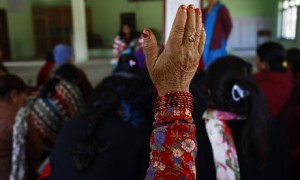London’s Waterloo Bridge over the River Thames is famously known as the “Ladies Bridge,” for it was built largely by women during the height of World War II. On another continent, women fighting a different war have built an equally remarkable structure: a 3,300-meter anti-salt dyke constructed by a women’s association in Senegal to reclaim land affected by rising levels of salt water.

These women are on the front-line of the fight against climate change, and their ingenuity and resolve resulted in a singular victory. The project allowed the revitalization of rice-growing activities and the re-generation of natural vegetation over 1,500 hectares, and benefiting over 5,000 people in Senegal.
Women are a minority on every major committee of the United Nations’ own top climate change decision making group.
Yet, women continue to be excluded from climate change solutions for agriculture. A look at United Nations report on female representations in main climate change decision bodies shows that women are a minority on every major committee of the United Nations’ own top climate change decision making group. For example, women hold only 6 percent of positions in the Advisory Board of the Climate Technology Centre and Network. At the same time, women smallholder farmers have limited access to agricultural training, credit, seeds, and inputs – all of which are essential for the development and adoption of climate-smart agricultural practices.
Most affected by climate change are the world’s 1.3 billion poor people, the majority of whom are subsistence farmers, women and their families. Furthermore, women make up an average of 43 percent of the global agricultural workforce and produce as much as 90 percent of the food supply in African countries, where they are also mainly responsible for providing water and fuel for their families. All this makes them exceptionally vulnerable to the effects of climate change.
Not only does women’s disempowerment prevent us from understanding the true extent to which climate change is disrupting the way of life for our most at-risk communities, it also perpetuates the antiquated narrative that women are victims, rather than agents, of change.
But, as seen in Senegal, women bring novel perspectives and solutions to the fight against climate change. Furthermore, studies have found that women in leadership improve organizations’ financial performance, strengthen the organizational climate, increase corporate social responsibility and reputation, leverage talent and enhance innovation and collective intelligence. Therefore, across every level of society, women’s leadership in addressing climate change must be supported.
While there are signs of change–including the recently announced appointment of Patricia Espinosa as Executive Secretary to the United Nations Framework Convention on Climate Change–much remains to be done, whether in the Board room or on the threshing floor.

